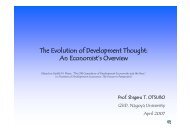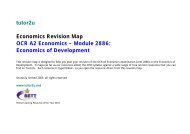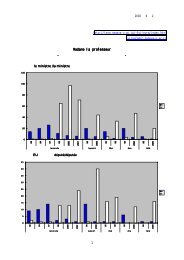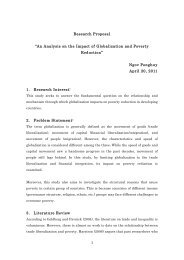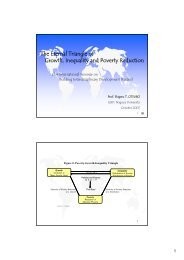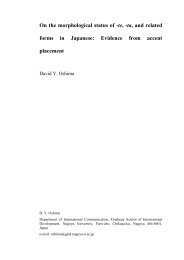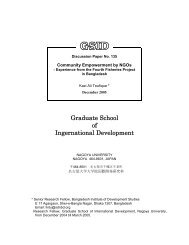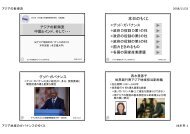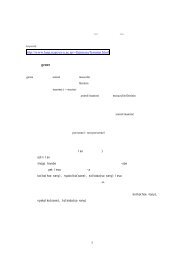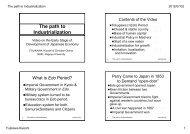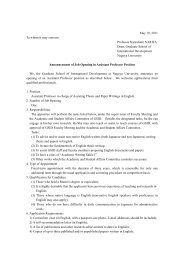Report
Report
Report
You also want an ePaper? Increase the reach of your titles
YUMPU automatically turns print PDFs into web optimized ePapers that Google loves.
T OURISM AND TRAVEL RELATED SERVICES 121<br />
limitation. However, the development of Internet and<br />
e-commerce has brought this into question, as these<br />
tools are increasingly used to make online bookings,<br />
enquiries and marketing. An ENT is frequently required<br />
for opening new bars or restaurants; citizenship<br />
requirements are sometimes imposed for liquor licenses<br />
and tourist guide licenses. Mode 3 is restricted to fixed<br />
equity limits and Mode 4 is usually unbound implying<br />
that foreign service providers are not allowed entry into<br />
the host markets.<br />
Liberalisation of tourism services is highly dependent<br />
on commitments made in other related sectors in<br />
particular transport services and others such as financial<br />
services (insurance, foreign exchange transactions),<br />
software services (computer reservation systems, billing,<br />
payments, etc.), distribution services and various<br />
business services (Kumar 2005). Thus while tourism<br />
services have witnessed more extensive coverage and<br />
more liberal offers than other services sectors, given<br />
their strong complementarity with other services,<br />
restrictions in these related services also influence the<br />
actual extent of liberalization in tourism services.<br />
South Asia being one of the poorest regions in the<br />
world it has special interest in tourism and travel<br />
services in view of this sector’s capacity to provide<br />
employment at all skill levels. Tourism is not really a<br />
sector but rather an agglomeration of crosscutting<br />
sectors, one of its appealing factors being its linkage to<br />
other sectors and activities.<br />
India<br />
CHARACTERISING SAFTA COUNTRIES’<br />
COMMITMENTS/INITIAL/REVISED OFFERS<br />
Out of the four subsectors of the tourism and travelrelated<br />
services sector India has offered to undertake<br />
commitments in three subsectors, namely hotels and<br />
other lodging services (CPC Ex. 641); travel agencies<br />
and tour operators services (CPC 7471); and tourist<br />
guides services (CPC 7472).<br />
Though India’s commitments cover a wide range<br />
of tourism services, still there are some services such as<br />
full restaurant services, self-service facilities, catering<br />
services, beverage serving services, etc., that have not<br />
been committed. However, its coverage in travel<br />
agencies and tour operators’ services and tourist guides<br />
services is full.<br />
In its sectoral commitments in the Market Access<br />
column India has put no restriction under Modes 1<br />
and 2 for hotels and other lodging services and travel<br />
agencies and tour operators services. Under Mode 3<br />
the entry is only through incorporation and subject to<br />
the condition that in the case of foreign investors having<br />
prior collaboration in these services in India, FIPB<br />
approval would be required. Mode 4 is unbound except<br />
as in the horizontal section. In the National Treatment<br />
column Modes 1, 2, and 3 are without any restrictions<br />
whereas Mode 4 refers to the horizontal section. For<br />
tourist guides services while Mode 1 is unbound albeit<br />
due to lack of technical feasibility and Mode 2 are<br />
without any restrictions, Mode 3 has the same<br />
restrictions as in the case of other tourism subsectors.<br />
However, Mode 3 is subject to additional restriction<br />
that there is a ceiling of 500 tourist guides conversant<br />
in Chinese, Spanish, Portuguese, French and Japanese.<br />
Mode 4 commitment for tourist guides services is indeed<br />
quite liberal as it mentions that there are no restrictions<br />
for the tourist guides conversant in Chinese, Spanish,<br />
Portuguese, French and Japanese languages though<br />
subject to a total ceiling of 500. For other tourist guides<br />
Mode 4 is unbound except as in the horizontal section.<br />
In the National Treatment column while Mode 1 is<br />
unbound on account of technical infeasibility, Modes<br />
2 and 3 are without any restrictions, Mode 4 is unbound<br />
and refers to the horizontal section. In the horizontal<br />
section, India has taken very meaningful market access<br />
commitments for the entry of contractual services<br />
suppliers and independent professionals in hotels and<br />
restaurant, travel agencies and tour operators services.<br />
The only requirement these service providers have is<br />
that apart from following usual visa formalities they<br />
must have proof of contract and they have to possess<br />
requisite educational and professional qualifications<br />
relevant to the service to be provided including work<br />
experience.<br />
In the National Treatment column there are some<br />
general limitations on Mode 3 such as in case of<br />
collaboration with public sector enterprises as joint<br />
venture partners, preference in access will be given to<br />
Foreign Service suppliers which offer the best terms<br />
for transfer of technology. Taxation laws for domestic<br />
and Foreign Service suppliers shall apply as per the<br />
provision of the Income Tax Act, 1961. Finally,<br />
subsidies, where granted, shall be available only to<br />
domestic service suppliers.<br />
From South Asia, Sri Lanka has made a request on<br />
India to offer full commitments under Market Access<br />
and National Treatment columns in Modes 1, 2, and 3<br />
in hotel, restaurant and catering services (Taneja et al.<br />
2004). As already noted, while India has not offered<br />
any commitments in restaurant and catering services,




